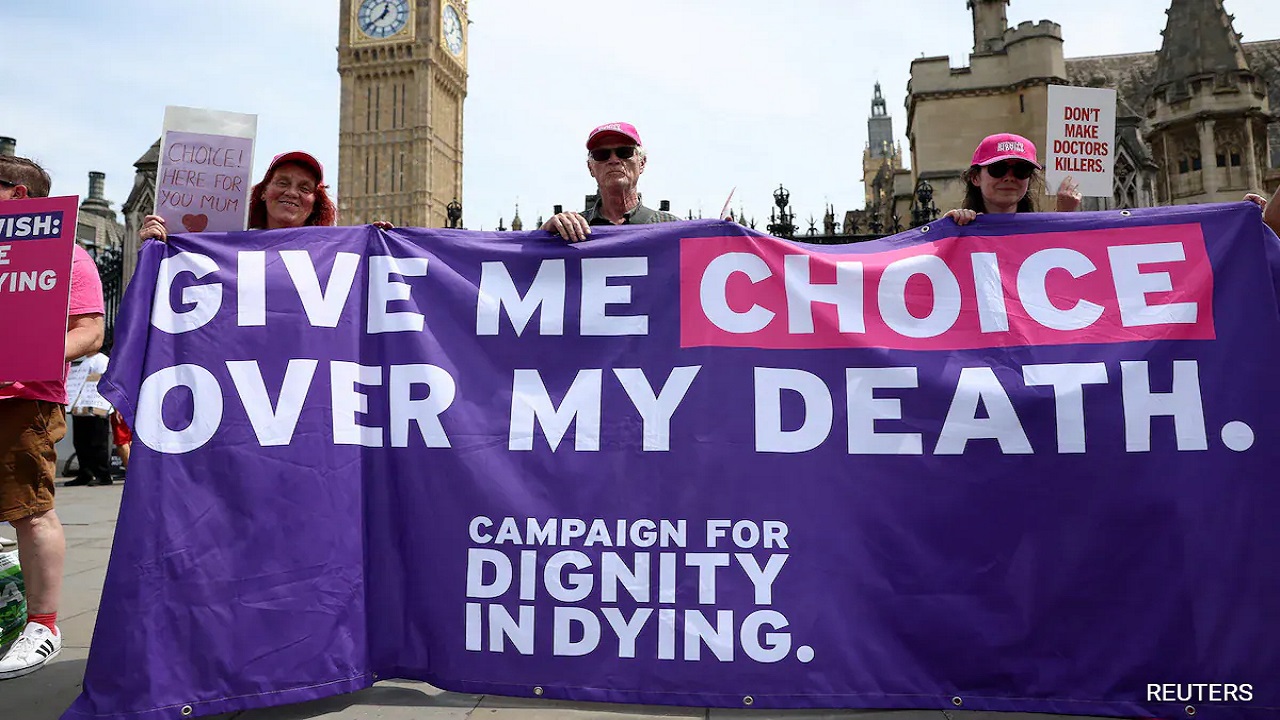From Compassion to Controversy: The Ethics of Euthanasia
Context:
The UK Parliament has recently passed the Terminally Ill Adults (End of Life) Bill in the House of Commons, allowing terminally ill patients in England and Wales with less than six months to live to legally opt for assisted dying under specific conditions.
About the UK Terminally Ill Adults (End of Life) Bill
What is it?
A legislation that permits terminally ill adults to end their lives voluntarily through assisted dying, under strict medical and legal safeguards.
Key Features:
-
Applicable in England and Wales.
-
Only for patients with less than 6 months of life expectancy.
-
Requires approval from:
-
Two doctors
-
One psychiatrist
-
A senior lawyer
-
A social worker
-
What is Euthanasia?
-
Derived from Greek: “eu” (good) + “thanatos” (death) → "Good Death".
-
It refers to intentionally ending a life to relieve unbearable suffering when there is no hope of recovery.
Types of Euthanasia:
-
Active Euthanasia:
Direct action to end life (e.g., lethal injection). -
Passive Euthanasia:
Withholding life-sustaining treatment (e.g., removal of ventilator). -
Voluntary Euthanasia:
Done with the patient's informed consent. -
Involuntary Euthanasia:
Without the patient’s consent — illegal and unethical.
Ethical Debate on Euthanasia
Arguments in Favour:
-
Right to Autonomy: Individuals should decide when and how to die.
-
Compassionate Relief: Helps end unbearable pain.
-
Dignified Death: Allows choosing peaceful and respectful end.
-
Support for Families: Reduces emotional and financial burden.
-
Better Resource Allocation: Focus healthcare on those with better recovery chances.
Arguments Against:
-
Sanctity of Life: Life is inviolable, regardless of suffering.
-
Risk of Coercion: Vulnerable groups may be pressured.
-
Palliative Alternatives: Advanced care can relieve most suffering.
-
Slippery Slope: May lead to misuse or endanger non-terminal patients.
-
Medical Ethics: Erodes doctor-patient trust and healing role of medicine.
Judicial Stand in India
-
Gian Kaur v. State of Punjab (1996):
Denied Right to Die under Article 21. -
Aruna Shanbaug v. Union of India (2011):
Allowed Passive Euthanasia under strict guidelines. -
Common Cause v. Union of India (2018):
Recognised Right to Die with Dignity; permitted Advance Directives for terminally ill.
Philosophical Perspectives
-
Antoine de Saint-Exupéry’s Humanism:
Life’s meaningful experience matters more than its biological continuation. -
Hans Jonas’ Ethics of Responsibility:
Warned against technological overreach that may devalue life’s natural course.
Conclusion
The euthanasia debate is a reflection of the conflict between personal liberty, ethical responsibilities, and societal values. As nations revisit end-of-life policies, India too must strike a balance between dignity, compassion, and regulation. Clear judicial guidance, ethical safeguards, and public awareness are essential for shaping a humane and sensitive policy.


.jpg)

Comments (0)